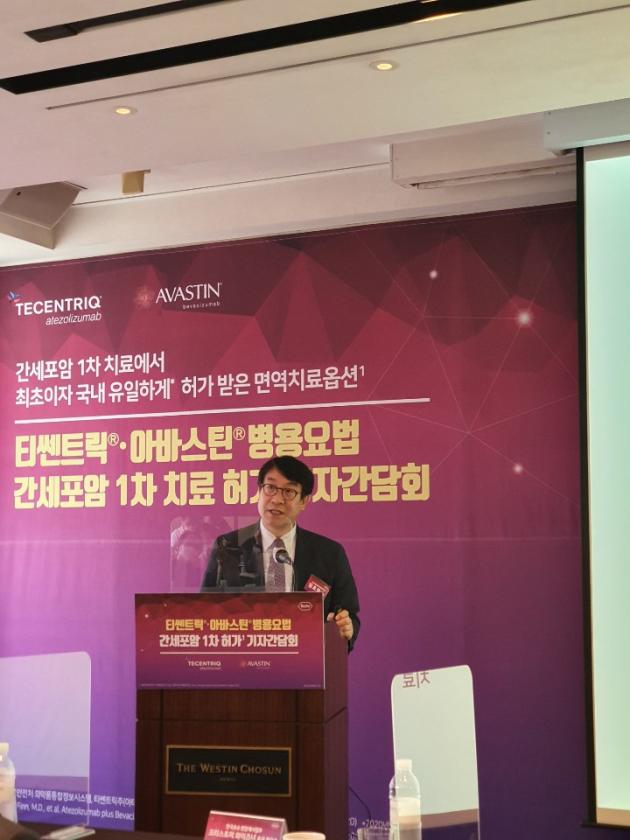Roche has become the first company in Korea to win the regulator’s nod to use immunotherapy as a first-line treatment for treating unresectable hepatocellular carcinoma (HCC).

The Ministry of Food and Drug Safety approved a combination therapy of Tecentriq and Avastin as a treatment for people with unresectable HCC, who have not received systemic therapy, on July 31, Roche Korea said in a news conference Wednesday.
“Liver cancer has the second-highest mortality rate from cancer in Korea after lung cancer, and is the leading cause of death in people in their 40s and 50s," Professor Lim Ho-yeong of Samsung Medical Center said. “Despite such high prevalence, the five-year relative survival rate of liver cancer that has distant metastasis, which refers to cancer that has spread from the original tumor to distant organs or distant lymph nodes, remained unchanged for the past 10 years as the field has shown a slow development."
Roche's IMbrave150 was the first study in 13 years to demonstrate an improved overall survival (OS) and progression-free survival (PFS) with immunotherapy in patients with unresectable or metastatic HCC compared to Sorafenib, the conventional first-line treatment, Lim added.
According to the results of the IMbrave150 study of 501 patients, including 47 Koreans, with inoperable locally advanced or metastatic liver cancer who had not yet received systemic treatment, the Tecentriq and Avastin combo-therapy reduced the risk of death by 42 percent and the risk of disease progression or death by 41 percent.
The combination therapy also improved the overall response rates (ORR), meaning complete or partial tumor shrinkage, with an ORR of 27.3 percent compared to Sorafenib's 12 percent.
Touching on ORR's sufficiency, Lim stressed that the ORR of about 30 percent in treating HCC is excellent data.
"This is even more so compared to conventional drugs," Lim said. "Until now, the disease control rate was the criterion for evaluating treatments because the response rate for hepatocellular carcinoma was so poor."
However, the combination of Tecentriq and Avastin set a new standard, he added.
Lim went on to say that Avastin can improve the anticancer effect of Tencentriq by reducing vascular endothelial growth factor (VEFG)-mediated immunosuppression.
"Therefore, Tecentriq and Avastin combination therapy is expected to provide meaningful clinical benefits to HCC patients," Lim said. "Such benefits are why major guidelines in the U.S. and Europe recommend Tecentriq and Avastin combo-therapy as the first-line treatment for unresectable hepatocellular carcinoma."
Roche Korea's Medical Director Lee Seung-hun said, "It is encouraging that Roche's combination therapy of Tecentriq and Avastin confirmed significant clinical results in HCC after also confirming positive results for non-small cell lung cancer."
Roche will continue its research and development for carcinomas with unmet medical needs, he added.

